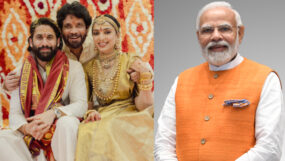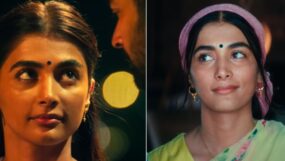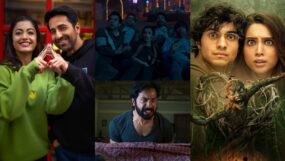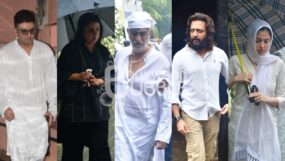
Drawing from rare archival materials, a film festival in Delhi this week will celebrate the untold legacy of the Indian animation industry and its pioneers, including legendary Dadasahab Phalke and unsung India-born American animator Clair Weeks.
Phalke, considered the father of modern Indian cinema, and immortalised for his path-breaking silent film ‘Raja Harischandra'(1913), was also among the few people from the then nascent film industry to have experimented with animation.
His first full-fledged attempt with this form of the medium, ‘Aagkadyanchi Mauj’ or ‘Game of Matchsticks’ was made in 1917, followed by ‘Vichitra Shilpa’ and then the opening title of ‘Setubandhan’ (1932), Phalke’s last silent film.
Later, R C Boral in Calcutta (now Kolkata) and Prabhat Films in Maharashtra also dabbled with animation, with the latter producing ‘Jambu Kaka’ in 1937. But, perhaps like ‘Alam Ara’, the first Indian talkie, these pioneering works in the animation field have not survived the ravages of time.
“Sadly, not much of our colonial-era film legacy has survived, let alone animation works. And, even though there are viewers and patrons of Indian and World Cinema in our country, we realised there was a gap in our understanding of Indian animation films, hence this event,” Curator of the festival, Chitra Roy told PTI.
Organised by city-based independent film society Lightcube, the festival, aptly titled ‘Sequences’, will run at the Instituto de Cervantes from December 18-20, during which it will also chart the journey of the birth of the country’s first animation studio in the late 50s at the Films Division in Bombay (now Mumbai).
“Post-independence, a lot of interesting projects were happening in this field, by independent filmmakers and by students and faculty at the NID (in Ahmedabad), who came up with projects, and very aesthetic nonetheless, which we in retrospect can say truly defined an Indian animation work.
But, most of these works are not known to people, let alone their creators,” she said.
Mysore-born American Clair Weeks, who came to India in 1956 after a successful stint at Disney, helped establish the first animation studio of India at the Films Division, which became known as the ‘Cartoon Film Unit’.
Weeks, who had earlier worked on ‘Bambi’ and ‘Snow White’, had travelled to Bombay as part of American Technical Co-Operation Mission and along with visionary colleagues at the Films Division, like Ezra Mir and D B Kothari laid the groundwork for animation industry in the country.
“Weeks made a phenomenal contribution in giving birth to a systematised animation industry in India, and later people like Ram Mohan and Vijaya Mule took that momentum forward.
“I mean, we all as a child we remember the ‘Ek Chidiya, Anek Chidiya’ animation sequence which used to be shown as a filler on DD channel, but how many know that it was her (Mule’s) brainchild, who had made it (‘Ek, Anek aur Ekta’) for Center of Education Technology in 1977″And, that is why we have chosen such pioneers and their trail-blazing works to celebrate, who don’t find space in the mainstream. Of course, the body of work available is much larger, but we have tried to capture the era and the essence,” Chitra said.
Weeks’s legacy will be one of the centrepieces in the upcoming festival, where the organisers have, besides a slew of films, also planned to mount a few panels as an accompanying exhibition.
Some of the rare films lined up for the event include ‘Glimpses of India Animation’ by the Films Division, Pramod Pati’s ‘Abid’, ‘Fisherman and Tuk Tuk’, ‘This Our India’, ‘Trip/Udaan’, and ‘The World of Goopi and Bagha’.
Chitra rues the loss of pioneering works of animation in India, and feels that the animation industry, if it has to flourish, should be patronised by the government and have its own museum like one has a museum for films. “Otherwise, the stories and the works, whatever is even left will be soon lost for want of preservation,” she said.
Ruing a lack of robust film preservation policy in the country, she said, the festival was a “challenge” to put together, as most of the works in the field is “scattered around” and what was available to us was rather “sketchy accounts”.
“Some of the rare films that we will be showcasing during the event have been sourced from the Films Division, some we have been able to ferret out in bits and pieces from the Internet…Some of works, we had only heard from film festivals, and it was surprising that such good works existed in India but not I in the mainstream,” Chitra said.
“So, Shilpa Ranade’s ‘Gopey Bagay’ I heard about from the Toronto International Film Festival, and it is so good and has Indian aesthetics, and it’s a feature length film, I believe this very well could have been given a commercial release, but again Indian animation in India is still to be patronised by the audiences here,” she added.
The organisers said that while animation industry in India has been growing thanks to mythology-themed works like ‘Ramayan’, ‘Choota Bheem’, ‘Krishna’, thanks to them being supported by big studios, but original scripts and independent projects are finding it hard to compete in this arena, despite quality content.
“Yes, we have not been able to produce works in comparison to the one brought out by Disney and Pixar, but whatever we have produced, especially off the mainstream, has been of great quality nonetheless,” she said.
She said that while attempt has been made to not miss out any of the pioneers, but the list is “non-exhaustive” and, while preparing for this festival, “we ourselves realised, how little we knew of such personalities and their seminal contribution to the field of animation in India.”
Post-independence, lot of Indian films, including Hindi ones, experimented with animation, especially in the opening title or part of scenes, like in ‘Chalti ka Naam Gadi’, ‘Naughty Boy’, both of who were made by another unsung pioneer Albert Zacharias, ‘Ab Dilli Door Nahin’, ‘Bhuvan Shome’.
“We hope through this festival we will be able to rekindle that interest back in animation that is Indian and also send out a message to the people in rightful position to preserve our past for our future,” she said.
Inputs by PTI




















Leave a Reply